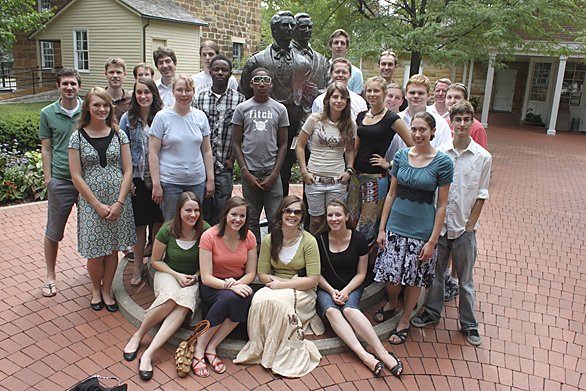
Did you know that a year after the Relief Society was organized, in 1843, a group of youth wanted to organize themselves to bring relief to the poor?
Heber C. Kimball hosted a houseful of young men and women eager “and delighted” to receive counsel from him. These young men and women were “lamenting the loose style of their morals—the frivolous manner in which they spent their time—and their too frequent attendance at balls, parties, etc.”
That first night was such a successful discussion, with the exhortation to lay aside their vanity and obey their parents more, that they assembled again with the entire house filled to overflowing. Each time they met, in fact, it was in a bigger house until Joseph suggested they meet in the lodge room above his store (where the Relief Society was organized). This room was still too small, but the attendance was evidence that the youth were truly interested in betterment to themselves, guidance, and involvement.
In one meeting, Elder Kimball counseled those in attendance to study the scriptures. By doing so, he said, ”you will be enabled to give a reason for the hope and the joy which exists within you—you will always be prepared to explain the doctrine in which you believe—you will ever be ready to prove and defend your religion—you will be well received in company, and will be esteemed by all wise and good men. Strive, therefore, to show yourselves worthy. Be faithful, be obedient, and acquit yourselves like men, and women, of God.”
At another meeting, the youth were told to “pay strict attention to the advice and command of their parents, who, being of mature years, and long experience, are much better calculated to guide the pathway of youth than they themselves. Elder Kimball warned them against giving heed to their passions, which he said would lead them into many snares, and difficulties.”
Joseph Smith addressed them in the lodge and complimented them on their enthusiasm and goodly desires. “He said he had never in his life seen such a large company of young people assembled together, pay such strict attention, listen with such profound silence, and keep such good order, as the assembly now before him.” He praised them, taught them, and “advised them to organize themselves into a society for the relief of the poor.”
A severe storm blew over the night of one of their meetings and attendance didn’t seem changed at all. Everyone there said they could not miss even one of their “Young People’s Meetings.” In fact, during the week, the favorite topic of conversation, amongst the youth, was what was learned and discussed at the previous meeting.
In the minutes of the first formation of this organization, it states, “The young gentlemen and ladies, citizens of the city of Nauvoo, are desirous of aiding and ameliorating the condition of the poor and of carrying out the principles of charity and benevolence, as taught in the Holy Scriptures, therefore, be it resolved that we form ourselves into a society to be styled the “Young Gentlemen and Ladies’ Relief Society of Nauvoo.”
I don’t know what ever happened to this organization. An article found in the Relief Society Magazine, in March 1917 issue, explains its existence. And these notes are taken from an article written in the Times and Seasons, April 1, 1843.